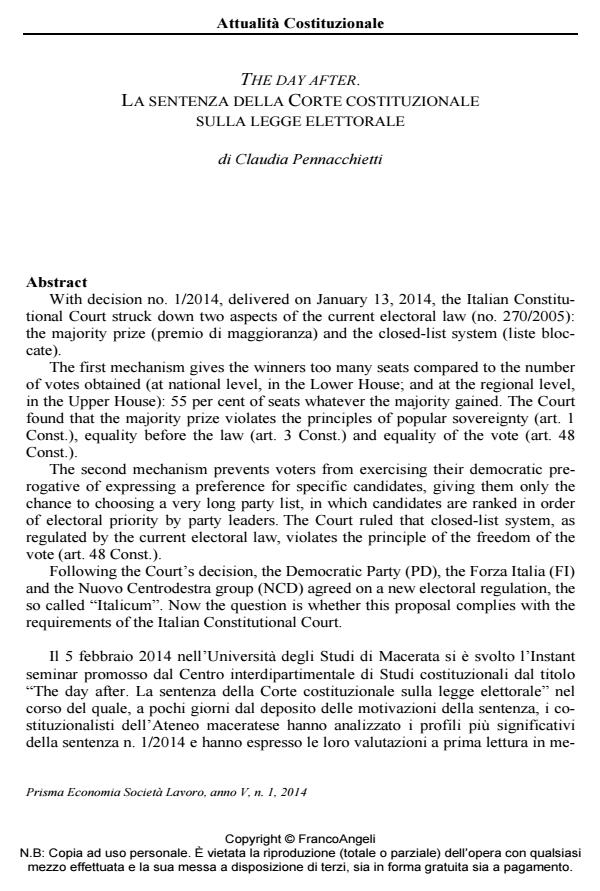The day after. La sentenza della corte costituzionale sulla legge elettorale
Journal title PRISMA Economia - Società - Lavoro
Author/s Claudia Pennacchietti
Publishing Year 2014 Issue 2014/1
Language Italian Pages 9 P. 156-164 File size 608 KB
DOI 10.3280/PRI2014-001018
DOI is like a bar code for intellectual property: to have more infomation
click here
Below, you can see the article first page
If you want to buy this article in PDF format, you can do it, following the instructions to buy download credits

FrancoAngeli is member of Publishers International Linking Association, Inc (PILA), a not-for-profit association which run the CrossRef service enabling links to and from online scholarly content.
With decision no. 1/2014, delivered on January 13, 2014, the Italian Constitutional Court struck down two aspects of the current electoral law (no. 270/2005): the majority prize (premio di maggioranza) and the closed-list system (liste bloccate). The first mechanism gives the winners too many seats compared to the number of votes obtained (at national level, in the Lower House; and at the regional level, in the Upper House): 55 per cent of seats whatever the majority gained. The Court found that the majority prize violates the principles of popular sovereignty (art. 1 Const.), equality before the law (art. 3 Const.) and equality of the vote (art. 48 Const.). The second mechanism prevents voters from exercising their democratic prerogative of expressing a preference for specific candidates, giving them only the chance to choosing a very long party list, in which candidates are ranked in order of electoral priority by party leaders. The Court ruled that closed-list system, as regulated by the current electoral law, violates the principle of the freedom of the vote (art. 48 Const.). Following the Court’s decision, the Democratic Party (PD), the Forza Italia (FI) and the Nuovo Centrodestra group (NCD) agreed on a new electoral regulation, the so called "Italicum". Now the question is whether this proposal complies with the requirements of the Italian Constitutional Court.
- LL Adesione Della Ue Alla Convenzione Europea Sui Diritti DelllUomo E La Costituzione Italiana (European Union Accession to the European Charter of Human Rights) Giancarlo Guarino, in SSRN Electronic Journal /2012
DOI: 10.2139/ssrn.2014707
Claudia Pennacchietti, The day after. La sentenza della corte costituzionale sulla legge elettorale in "PRISMA Economia - Società - Lavoro" 1/2014, pp 156-164, DOI: 10.3280/PRI2014-001018